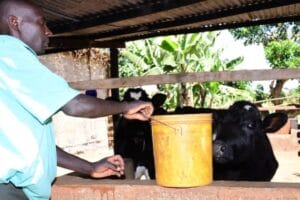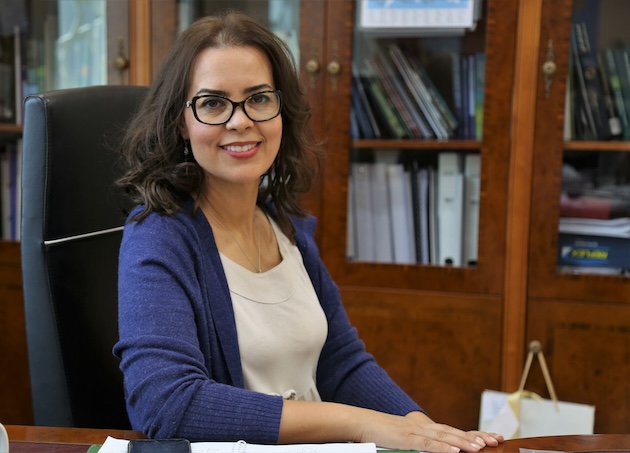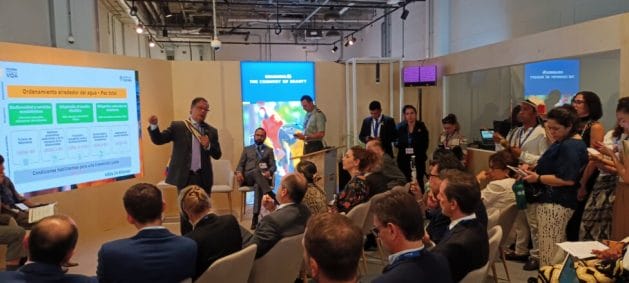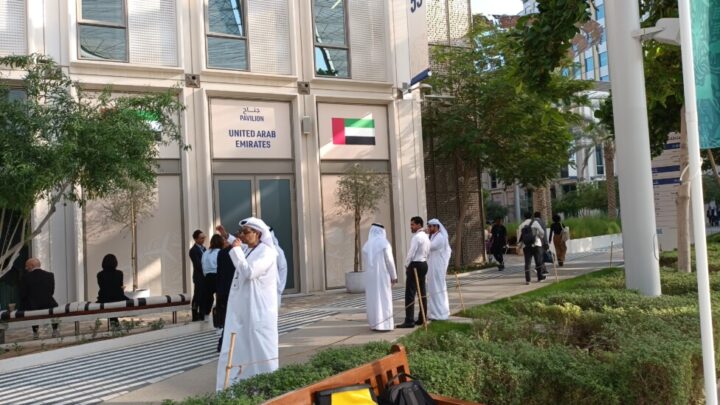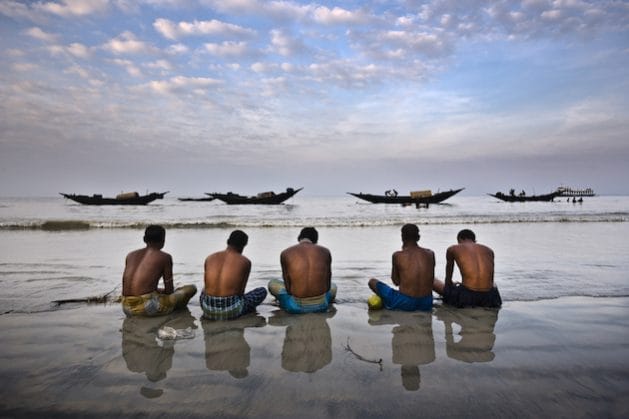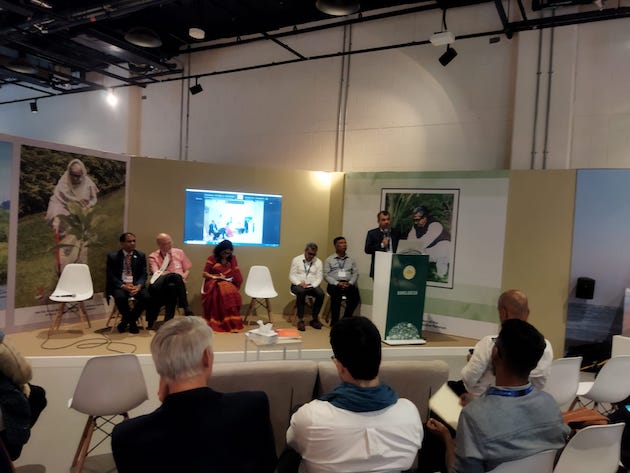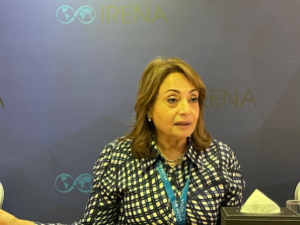
Africa, Climate Action, Climate Change, Conferences, COP28, Development & Aid, Editors’ Choice, Energy, Environment, Featured, Global, Headlines, Sustainable Development Goals, TerraViva United Nations
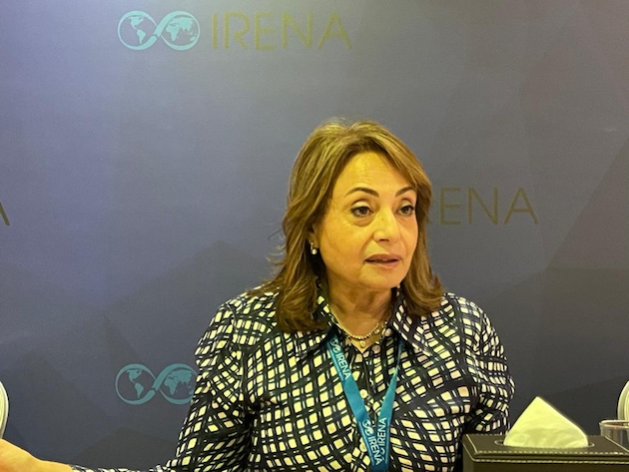
Dr. Amani Abou-Zeid is the current African Union (AU) commissioner for Energy and Infrastructure. She believes that cross-border approaches are critical for clean energy affordability. Credit: Aimable Twahirwa/IPS
– Investors, regulators, researchers, policymakers, and representatives of renewable energy companies, acknowledged the key challenges of shifting away from fossil fuels to renewable energy in Africa when they gathered in Abu Dhabi, United Arab Emirates (UAE) this week.
The latest estimates by the African Development Bank show that Africa’s energy potential, especially renewable energy, is enormous, yet only a fraction of it is currently employed. Official projections indicate that the demand for energy could also be around 30 percent higher than it is today over the next decade on the continent.
Francesco La Camera, the Director-General of the International Renewable Energy Agency (IRENA) stated that the energy transition is accelerating rapidly, but it clearly remains off track, with an unacceptable uneven distribution of renewable growth that still disproportionately affects the Global South.
“African governments and other stakeholders should adopt innovative solutions to overcome pressing challenges and achieve the energy transition,” La Camera told IPS in an interview.
According to him, there is opportunity [for the continent] to prioritize and narrow down collective actions to overcome the structural and systemic barriers that are impeding progress.
In Africa, experts believe that there are multiple dimensions to energy poverty, which is associated especially with the lack of clear plans and a clear understanding of what the continent wants to achieve.
“Electricity remains the backbone of Africa’s new energy systems, powered increasingly by renewables but a large part of the continent is still left out of the energy transition,” said Bruce Douglas, the Chief Executive Officer at the Global Renewables Alliance, one of the global coalitions of leading industry players committed to accelerating the global transition to renewable energy.
Yet several new commitments were made at the latest UN Climate Change Conference (COP 28) that took place in Dubai, UAE, last year, giving further momentum to the energy transition. Experts are now exploring priorities for the energy transition and immediate steps to ensure that current policies on the continent are improved to encourage greater deployment of renewables.
The latest estimates show that, with Africa accounting for around 39 percent of the world’s renewable energy potential, several renewable energy milestones can be achieved.
“Private and public investment is critical to tackling the multiple dimensions of today’s energy crisis on the continent but to ensure energy security, diversification of various sources is also essential,” Douglas told IPS.
Africa, for example, has abundant hydro, solar, wind, geothermal, hydrogen, and bioenergy resources, but still, the continent’s current energy generation mix continues to rely on fossil fuels, while renewable sources account for nearly 18 percent of the electricity output, it said.
Whereas countries committed on the sidelines of last year’s UN Climate Change Conference to accelerate progress towards tripling renewable power capacity globally to at least 11 terawatts (TW) by 2030, some experts believe that this is still not a long-term solution as more than half of the population still lacks access to electricity.
Amani Abou-Zeid, the Commissioner for Infrastructure and Energy of the African Union Commission (AUC) told IPS that a cross-border approach is critical for participating countries in the transition to clean energy affordability.
“Some countries in Africa have embarked on cross-border projects on clean energies but much more effort is needed to develop really sustainable transitions and adequate instruments,” she said.
The Africa Continental Power System Masterplan, a blueprint currently being developed by the African Union Development Agency (AUDA-NEPAD), highlights some key strategies for countries across the continent to identify key components at national and regional levels that will enable the creation of a smart power systems master plan that promotes access to clean, affordable, reliable, and sustainable electricity supplies across the continent by 2040.
Adja Gueye, Director of Promotion and Cooperation at the National Agency for Renewable Energies in Senegal points out that overall, African countries need appropriate plans at the policy level to overcome some key hurdles on the path to clean energies.
“To facilitate this transition, it would be appropriate for African countries to revise their regulatory framework and move towards harmonization, since the continent needs to improve regional and cross-border electricity interconnections,” she told IPS
Both Gueye and Abou-Zeid are convinced that without infrastructure and appropriate green energies policies and strategies at national and regional levels, it is challenging and impossible to buy and sell electricity across borders.
“Top-down governmental policies and long-term plans on clean energies in Africa are essential,” Abou-Zeid said of the current strategy to establish a long-term continent-wide planning process for power generation and transmission involving all five African power pools.
These include the Central African Power Pool (CAPP), East African Power Pool (EAPP), Northern African power Pool (COMELEC), Southern African Power Pool (SAPP) and Western African Power Pool (WAPP).
Dr. Jimmy Gasore, Rwanda’s Minister of Infrastructure, who is also the current chair of the International Renewable Energy Agency (IRENA) points out that Africa’s climate goals necessitate collective recognition that the energy transition is not just about technological change but also about ensuring equity and justice.
“We need to ensure that the benefits of the energy transition are universally accessible, prioritizing the needs of the most marginalized communities,” he said.
To optimize and diversify green energies on the continent, some experts also stress the importance of encouraging effective cooperation between the private and public sectors in renewable energy and energy efficiency projects.
“To prepare for the current transition to renewable energy, partnerships are essential,” said Gueye of the National Agency for Renewable Energies in Senegal, one of the few dedicated national agencies dealing with clean energies in Africa.
IPS UN Bureau Report

